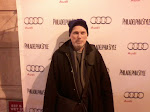What is a star? Andy Warhol, when he started making underground films, dubbed his bohemian actors “super stars.” Lou Reed, Gerard Malanga and Jackie Curtis were talented; Jackie Curtis’ trajectory seems like the story of a star born to burst; he thought he was James Dean for a day. Jean-Michel Basquiat, from later in Warhol’s life, died similarly or, as they say, tragically: heroin.
The New York Times once described Hannah Wilke as Claes Oldenburg’s greatest objet trouve. After her career as a performance artist had attained an arc well beyond Oldenburg, after attaining what fame the art world offers, Wilke was struck with lymphoma, a disease that killed her mother. She had documented her mother’s illness; she documented her own ruthlessly. Her final photographic acts of art were horrifying, courageous, ugly and real. Was she a star?
Hannah Wilke was only an art-world star. Babe Ruth was more than a baseball star. Errol Flynn was a star and a creep. Pablo Picasso and Andy Warhol were celebrities; Yoko Ono is still a celebrity. John Lennon was a rock star. Perhaps Wilke was a heroine. But artists and poets are not stars because stars have vast, uneducated publics who follow their doings, for good or ill, on television. You need brains to appreciate contemporary art, poetry and music.
Giant (1959), starring Liz, James Dean and Rock Hudson, was filmed in Marfa Texas; but Don Judd established a contemporary art center there that Liz’s fans rarely visit.
Poets and painters are known for their work. Actors are known for their persons.
Oprah or even Charley Rose won’t do it. The desperate classes of Hollywood fans described by Nathaniel West equally with the drunken blue-collar sports jock have no truck, after college, with literature, or philosophy, or art.
There are stars because of the night.

